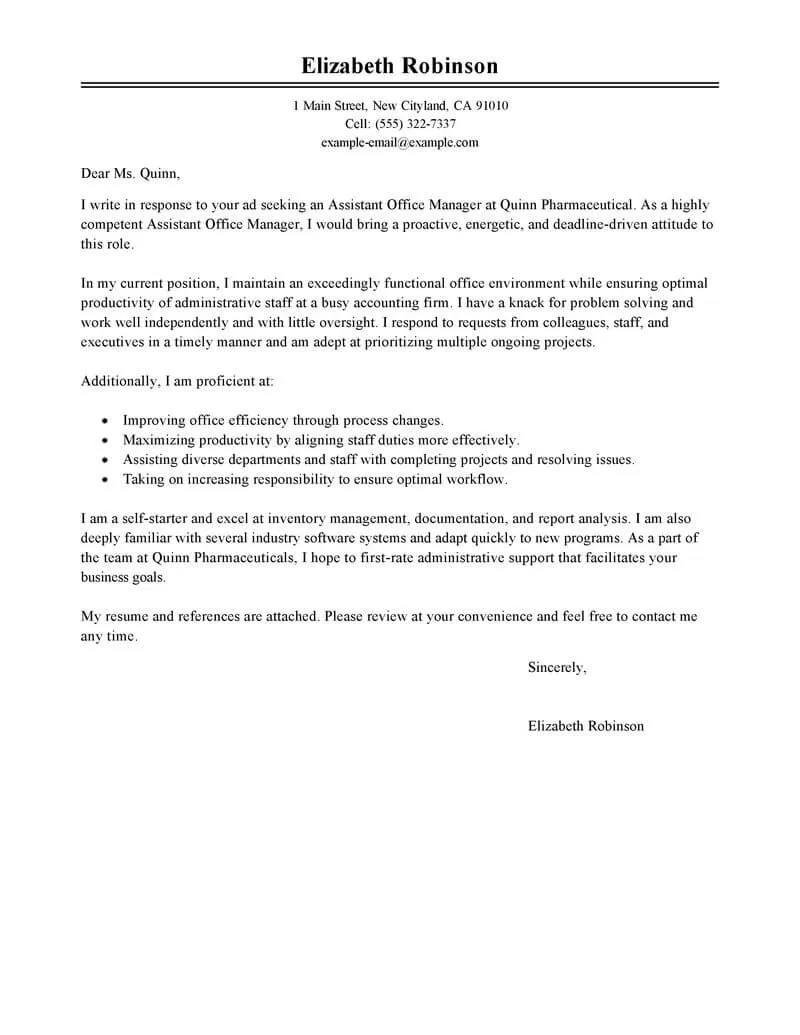Crafting a Compelling Admin Assistant Cover Letter
A well-crafted cover letter is your first introduction to a potential employer and can significantly impact your chances of securing an interview. For an admin assistant role, where attention to detail and communication skills are paramount, a compelling cover letter can set you apart from other candidates. This guide will help you craft a cover letter that not only showcases your qualifications but also highlights your personality and enthusiasm for the position. A strong cover letter demonstrates your understanding of the role and your ability to fulfill its responsibilities, ultimately increasing your likelihood of getting hired. It’s your opportunity to shine before even stepping foot in the office.
Understanding the Purpose of a Cover Letter
The primary purpose of a cover letter is to introduce yourself, express your interest in a specific role, and provide a brief overview of your qualifications and experience. It complements your resume by offering a more personalized narrative. Unlike your resume, a cover letter allows you to connect your skills and experiences to the specific requirements of the job, demonstrating why you are the ideal candidate. It provides the space to elaborate on your key strengths and to showcase your personality and enthusiasm for the opportunity. Consider it a tool to highlight your unique value proposition.
Highlighting Key Skills
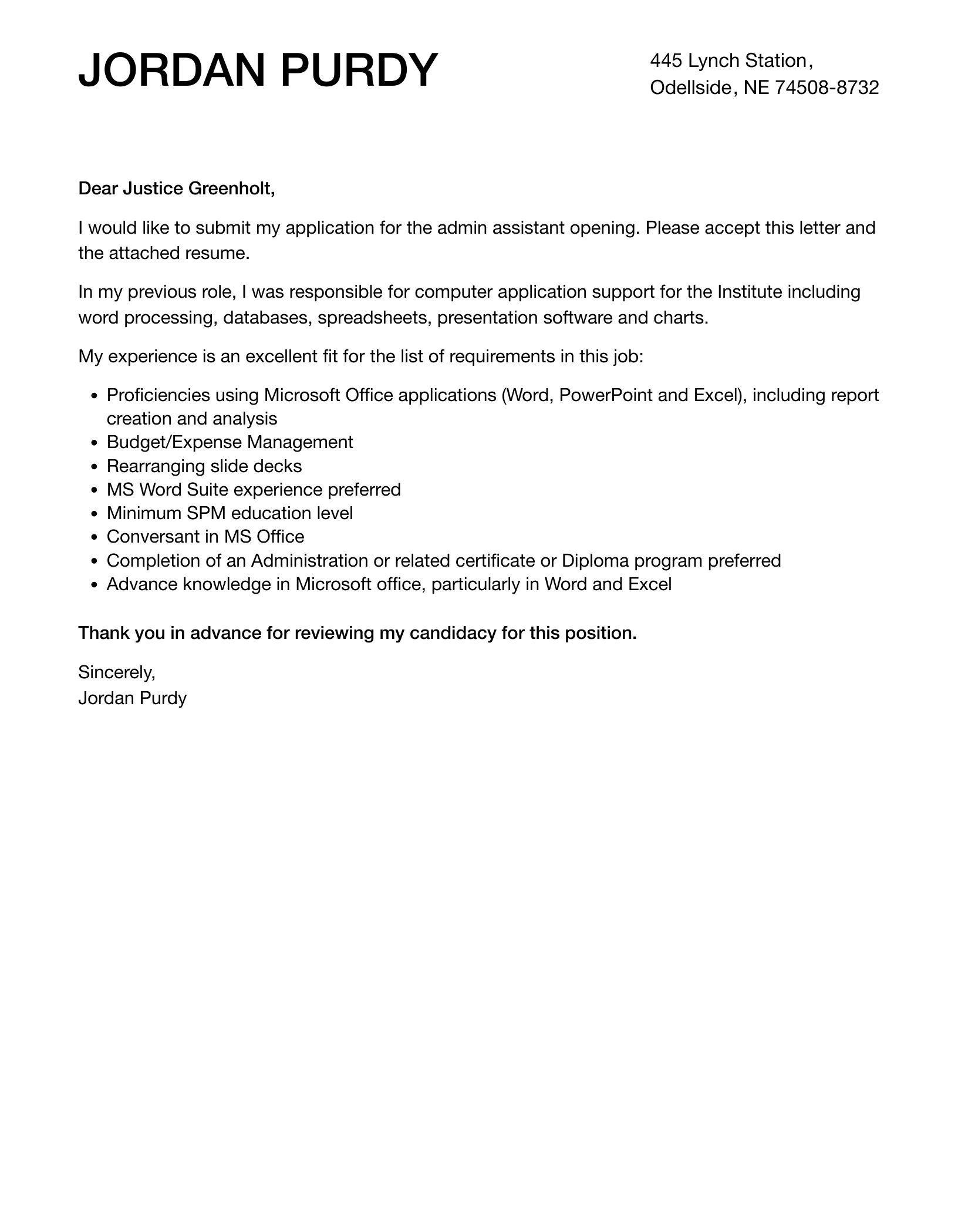
Administrative assistant roles require a diverse skillset. In your cover letter, you must showcase the skills most relevant to the position. Identify the key requirements mentioned in the job description and highlight the skills where you excel, and where you have the most experience. This section should provide the employer with a glimpse of what you can bring to the role and the ways that you can contribute to the company’s success. Focus on both your hard and soft skills to provide a more comprehensive overview.
Administrative Skills
Administrative skills are the core of any admin assistant’s role. These skills include but are not limited to, managing calendars, scheduling meetings, preparing documents, handling correspondence, and organizing files. Mention your proficiency with software like Microsoft Office (Word, Excel, PowerPoint, Outlook) or any other relevant software. Showcase your experience in managing office supplies, coordinating travel arrangements, and other day-to-day operations. Emphasize your ability to maintain an organized and efficient office environment. Your cover letter should provide the evidence that you can perform the necessary tasks required by the hiring manager.
Communication Skills
Excellent communication skills are essential for an admin assistant. Highlight your ability to communicate clearly and effectively, both verbally and in writing. Mention your experience in answering phones, greeting visitors, and composing professional emails and letters. Showcase your interpersonal skills and your ability to build rapport with colleagues, clients, and vendors. Provide instances where your communication skills played a crucial role in resolving a problem or improving team coordination. Your writing should be professional and articulate.
Organizational Skills
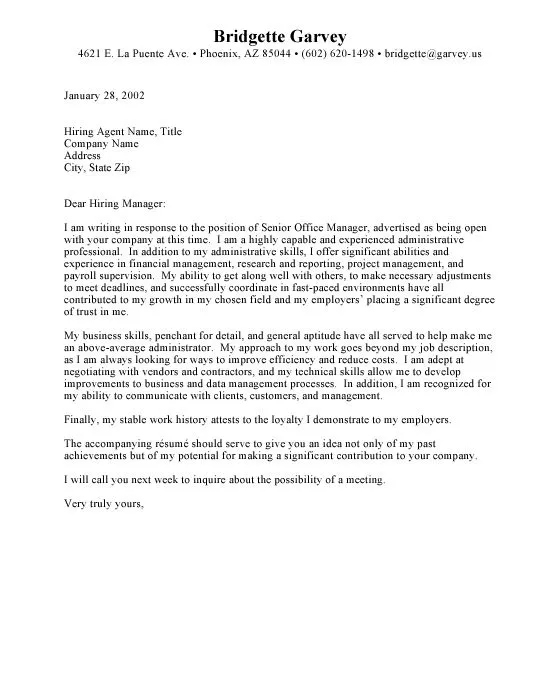
Admin assistants must be highly organized to manage multiple tasks simultaneously. Emphasize your ability to prioritize tasks, manage deadlines, and maintain accurate records. Mention your experience in organizing and maintaining filing systems, both physical and digital. Showcase your ability to manage time effectively and your attention to detail. Highlight instances where your organizational skills helped improve efficiency or reduce errors. This shows the employer that you are a capable and detail-oriented candidate for the position.
Formatting Your Cover Letter for Impact
The format of your cover letter is just as important as its content. A well-formatted letter is easy to read, professional, and visually appealing. Choose a clean and readable font, such as Times New Roman, Arial, or Calibri. Maintain a consistent font size and style throughout the document. Keep your letter concise, aiming for one page in length. Use clear headings and bullet points to organize information and make it easy for the reader to scan your letter. Make sure it is easy to read and highlights your key strengths.
Contact Information and Date
Start your cover letter with your contact information at the top, including your name, address, phone number, and email address. Include the date below your contact information. This allows the employer to easily identify your contact information and see how current the information is. Make sure your information is correct and up to date.
The Salutation
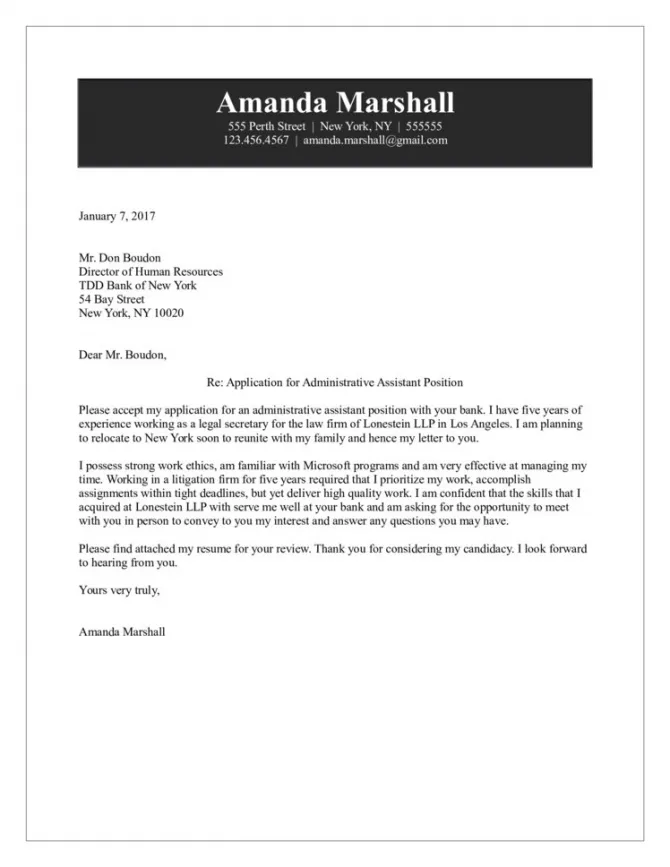
Use a professional salutation such as “Dear Mr./Ms./Mx. [Last Name]” if you know the hiring manager’s name. If you don’t know the name, use “Dear Hiring Manager” or “Dear [Company Name] Team.” Avoid generic salutations like “To Whom It May Concern.” This shows that you have done your research and are attentive to detail.
The Body Paragraphs
The body of your cover letter should consist of a few well-crafted paragraphs. The first paragraph should state the position you are applying for and where you found the job posting. The following paragraphs should highlight your skills, experience, and accomplishments that align with the job requirements. Use specific examples to demonstrate your capabilities. The final paragraph should reiterate your interest in the position and your eagerness to discuss your qualifications further.
The Closing and Signature
End your cover letter with a professional closing such as “Sincerely,” “Best regards,” or “Thank you.” Follow with your typed name and leave space for your signature if you are submitting a hard copy. This is a standard closing that shows professionalism.
Showcasing Your Achievements and Experience
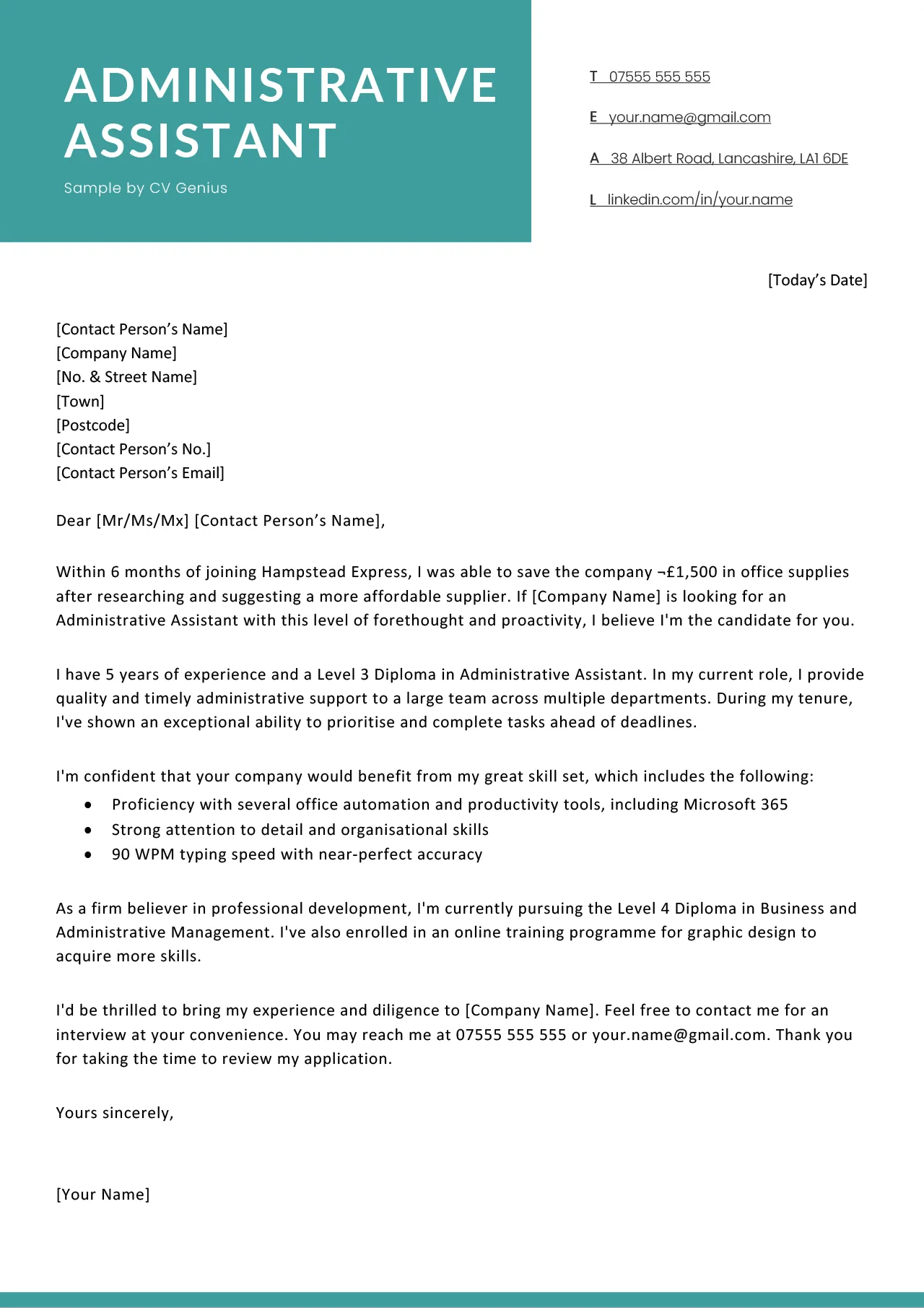
Instead of just listing your responsibilities, focus on what you have achieved in previous roles. Provide specific examples of how you have used your skills to benefit your previous employers. Quantify your accomplishments whenever possible to demonstrate the impact of your work. Highlighting your achievements will show the employer that you have experience, and the ability to add value to the company.
Quantifying Your Accomplishments
Use numbers and data to quantify your achievements. For example, instead of saying “Managed a high volume of calls,” say “Managed 100+ calls per day.” Or, instead of “Improved office efficiency,” say “Improved office efficiency by 15% through implementing a new filing system.” This makes your accomplishments more concrete and impactful. Always show the hiring manager the tangible results you delivered at your previous roles.
Tailoring Your Letter to the Job Description
Customize your cover letter for each job you apply for. Review the job description carefully and identify the key requirements and preferred qualifications. Tailor your letter to address these specific needs. Highlight the skills and experiences that directly align with the job description and use the same keywords and phrases that are used in the job posting. This demonstrates to the employer that you have the skills and abilities that they are looking for.
Common Mistakes to Avoid
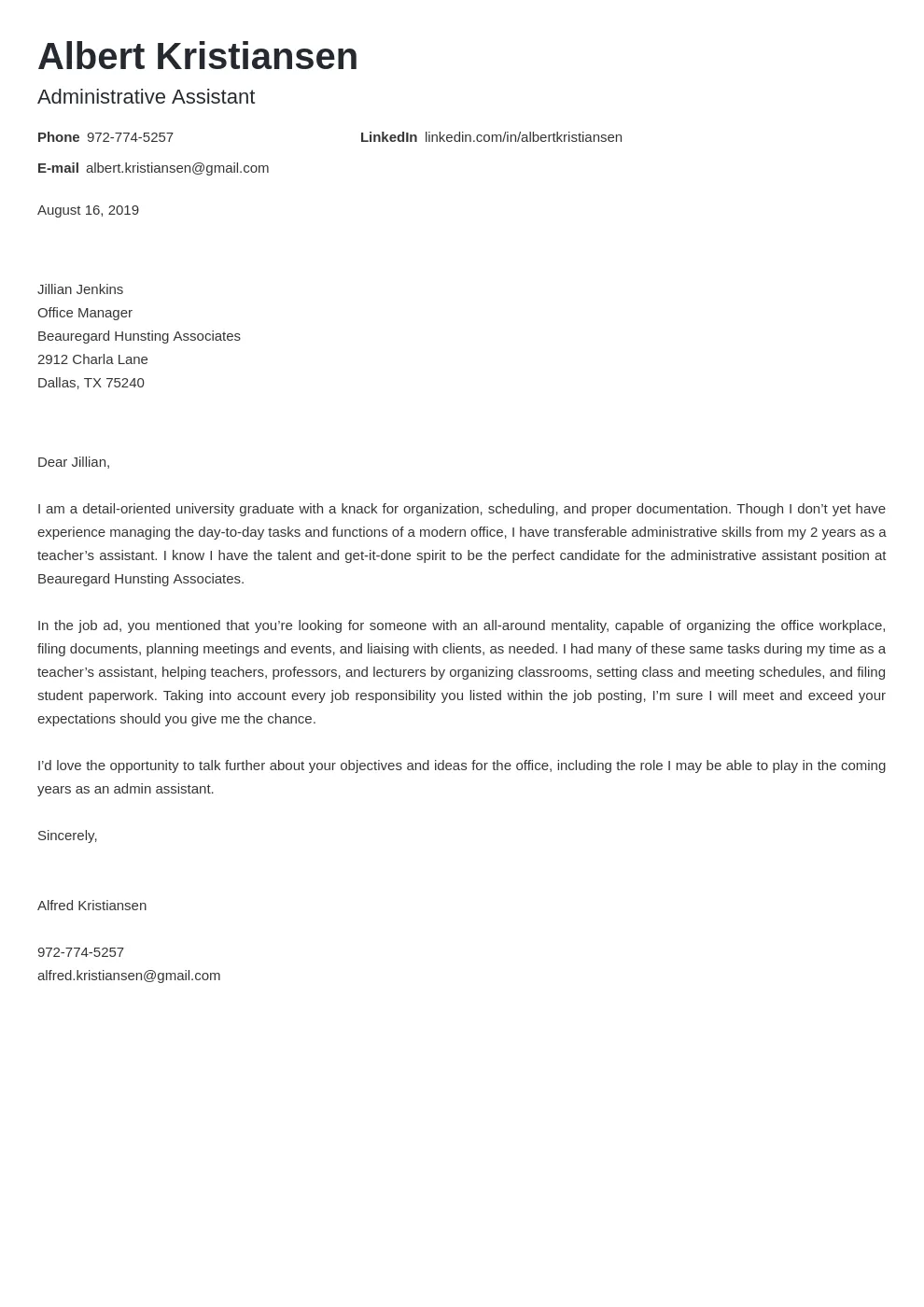
Avoid these common mistakes to make your cover letter as effective as possible. Taking the time to avoid these common errors can have a significant impact on the potential employer and your chance to get an interview.
Typos and Grammatical Errors
Typos and grammatical errors can damage your credibility. Proofread your cover letter carefully before submitting it. Use a spell checker and grammar checker, but also read your letter aloud to catch any errors that the software might miss. Ask a friend or family member to proofread your letter for you as well. Always ensure that your letter is free of errors.
Generic Cover Letters
Avoid using a generic cover letter that you send to every job. Customize your cover letter for each position you apply for, showcasing your understanding of the role and your genuine interest in the company. Generic cover letters often fail to capture the attention of the hiring manager. Showing that you have done your research on the company will have a major impact.
Ignoring the Job Requirements
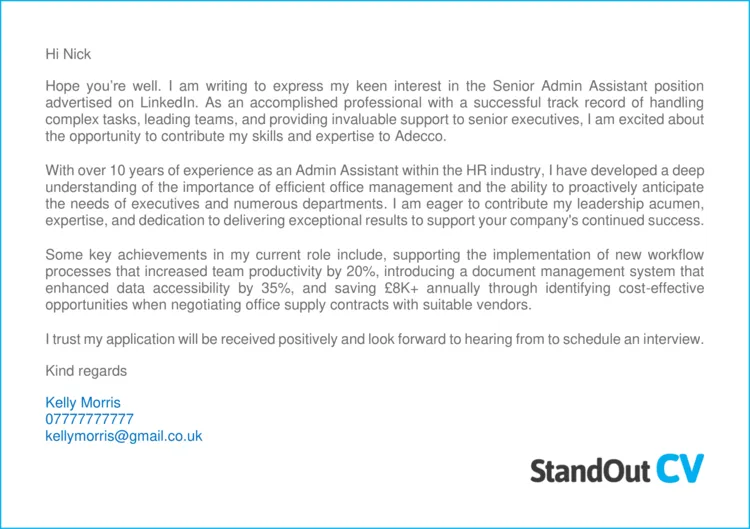
Read the job description carefully and address each of the key requirements in your cover letter. Failing to do so can make it appear that you are not a good fit for the role. Highlight your skills and experience that align with the job requirements, and explain how you can meet the needs of the employer. This is one of the most important aspects of the cover letter.
Finalizing and Submitting Your Cover Letter
Before submitting your cover letter, take a few final steps to ensure it is polished and ready for review.
Proofreading and Editing
Proofread and edit your cover letter one last time. Check for any typos, grammatical errors, or formatting issues. Ensure that your contact information is correct and up to date. Make sure your content is free of errors.
Choosing the Right File Format
Unless the job posting specifies a particular file format, save your cover letter as a PDF to ensure that your formatting is preserved. This will make it easy for the hiring manager to read the document. PDF files are also less likely to be corrupted or changed when opened on different devices. Make sure you upload the correct file.
In conclusion, a well-crafted cover letter is crucial for landing an admin assistant position. By showcasing your skills, experience, and achievements in a clear and compelling manner, you can make a strong impression on potential employers. Remember to tailor your letter to each job, highlight relevant skills, and avoid common mistakes. Follow the tips outlined in this guide, and you will increase your chances of getting an interview and ultimately, your dream job. Good luck with your job search!
